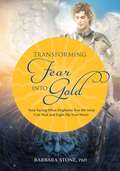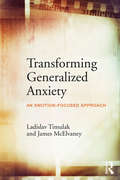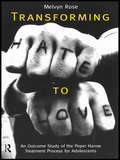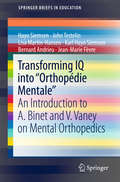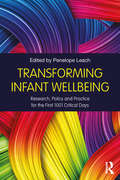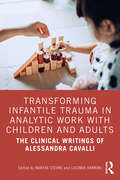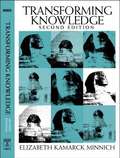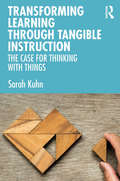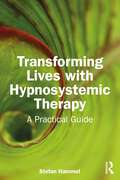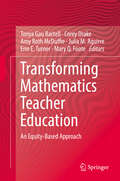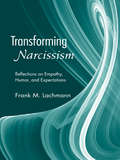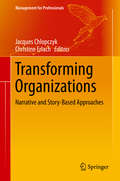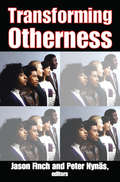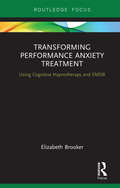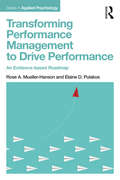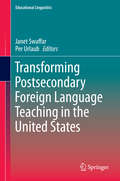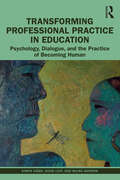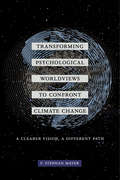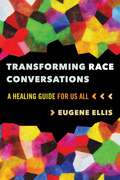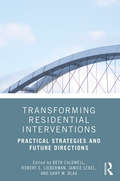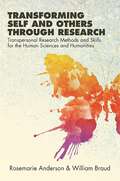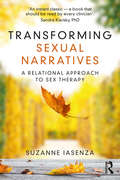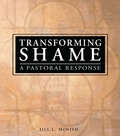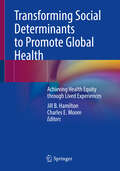- Table View
- List View
Transforming Fear Into Gold: How Facing What Frightens You Most Can Heal and Light Up Your Life
by Barbara Stone Janet Nester Karen Kane Stephanie Marohn"Transforming Fear into Gold" is a guide to converting your greatest fears--fear of dying, fear of poverty, fear of annihilation, fear of the unknown--into energy you can use to burst the limitations that bind you and expand into your full human potential. Dr. Stone demonstrates this metamorphosis with a variety of inspiring case histories from her psychotherapy practice using her step-by-step Soul Detective Detrimental Energy Protocol. The protocol calls in angelic protection, identifies harmful influences, finds the cognitive distortions running the fears, and shines the golden light of consciousness into the dark places to heal the heart and restore the soul. She gives detailed and graphic accounts of how to reach people stuck in dark places and bring them into the light.
Transforming Generalized Anxiety: An emotion-focused approach
by Ladislav Timulak James McElvaneyTransforming Generalized Anxiety: An Emotion Focused Approach examines an approach to treating generalized anxiety disorder (GAD) which attempts to uncover the deeper, underlying emotional experiences that clients are afraid of. It also demonstrates how these painful experiences can be transformed in therapy into a form of emotional resilience by generating experiences of self-compassion and healthy, boundary setting, protective anger. Though most of the literature on treating GAD is dominated by Cognitive Behavior Therapy, this book presents emotion-focused therapy as an alternative treatment of this condition. The emotional resilience this particular approach instils serves as a resource when encountering triggers of emotional vulnerability, but also decreases the client’s need to avoid hitherto feared triggers and the emotional experiences they bring. Developed in a series of research studies, and illustrated with reference to case examples, this book offers a practical, theoretically informed, evidence based guide, to conducting therapy with clients. Using clinical material, and applying the outcome of a series of research studies, Transforming Generalized Anxiety will equip psychotherapists and counsellors with the means to help GAD clients transform core painful experiences into a sense of empowerment and inner confidence.
Transforming Hate to Love: An Outcome Study of the Peper Harow Treatment Process for Adolescents
by Melvyn RoseThe Peper Harow residential community was founded in 1970 and gained international repute for its pioneering work with disturbed adolescents. For over 20 years, this remarkable establishment provided a therapeutic environment for teenagers who had often suffered appalling abuse, and yet for whom the state's only remedial provision until then had been in the punitive form of the approved schools. In Transforming Hate to Love Melvyn Rose, the community's founder, assesses Peper Harow's success in managing disturbed behaviour, and offers views on areas where the establishment could have responded more effectively to the needs of its residents. His study is complemented by the testimony of ex-residents helped by Peper Harow to overcome their fears and abandon their disruptive behaviour. The overwhelmingly positive outcome indicates the need for a review of current social policy towards deviant youth and shows how society as a whole would benefit from a psychodynamic view of the causes of criminality and mental ill-health among the young.
Transforming IQ into “Orthopédie Mentale“: An Introduction to A. Binet and V. Vaney on Mental Orthopedics (SpringerBriefs in Education)
by Hayo Siemsen John Testelin Lisa Martin-Hansen Karl Hayo Siemsen Bernard Andrieu Jean-Marie FèvreThis volume discusses Alfred Binet’s works on pedagogy based on his “Orthopédie Mentale”. Binet had empirically found that his idea of a test of general intelligence could be replaced by a test on “problem areas”. These problem areas were then to be specifically addressed and improved within a relatively short time. As a result, students dramatically improved in their IQ test results. Binet died before he could publish the results. Fortunately, the rector of the school, Victor Vaney, published the results of Binet’s experiments in his school. This volume provides the first English translation of Vaney's publication as well as an introduction to Binet's mostly forgotten late work.
Transforming Infant Wellbeing: Research, Policy and Practice for the First 1001 Critical Days
by Penelope LeachTransforming Infant Wellbeing brings together science and policy to highlight the critical importance of the first 1001 days of infancy: the period from conception to the second birthday. Introduced and edited by Penelope Leach, who uniquely combines academic knowledge of infant development with the ability to write about it for wide audiences, the book has at its heart 25 original articles by acknowledged experts in different aspects of infant health and development. Brought together, they showcase innovative science and best practices to a wide range of readers: to scientific colleagues in different disciplines; to politicians and policy makers; to local authority commissioners and specialist advisors, statutory and voluntary organisations and parents. This book has a two-fold purpose in science and in social policy. First, to collect new papers by leading scientists in a single volume, which ensures they reach a broad audience. Second, by introducing and commenting on the significance of these new findings, the book highlights both the benefits that accrue to society when it acts accordingly, and the costs, financial and social, of our failure to do so. In the last 50 years, interest in infant development and especially maternal and infant mental health has burgeoned. A large number of issues at the forefront of child development research mirror those of yesterday, but the research brought to bear upon them has transformed. Thanks largely to technological and statistical advances, we now know a great deal that researchers of earlier generations could only surmise. However, increasing knowledge of infancy has not been matched by an increasing impact on parents and professionals, politicians and policy makers. Bringing contemporary studies involving pregnancy, birth, infancy and toddlerhood together, along with the undisputed evidential findings that flow from them, large gaps between what is known and what is done become apparent. By focusing on what can be done to fill those gaps, Transforming Infant Wellbeing renders inescapable the need to rethink current priorities. It represents essential reading for researchers, parents and policy makers of infancy.
Transforming Infantile Trauma in Analytic Work with Children and Adults: The Clinical Writings of Alessandra Cavalli
by Lucinda Hawkins Martha StevnsThis vivid and moving volume presents the clinical work and writings of Alessandra Cavalli, an internationally known child and adult psychoanalyst who taught and supervised widely, ran infant observation seminars in the UK and Europe and was closely involved in the development of child analysis training in Russia. Informed by a deep knowledge of theory, each chapter draws on many strands of both psychoanalytic and Jungian thought, integrating multiple analytic languages into a coherent clinical language specific to Cavalli. The book includes 11 of her most important papers about work with children and adults, with an introduction by the distinguished Jungian psychoanalyst Warren Colman. Her work was primarily concerned with the impact of trauma on the developing self and the importance of weathering emotional storms in search of meaning, and the book will be fascinating reading for clinicians of different psychoanalytic approaches working with adults and children as well as students of psychotherapy and counselling.
Transforming Knowledge, Second Edition
by Minnich Elizabeth KamarckThis is a book about how we define knowledge and how we think about moral and political questions. It argues that the prevailing systems of knowledge, morality, and politics are rooted in views that are exclusionary and therefore legitimate injustice, patriarchy, and violence. That is, these views divide humans into different kinds along a hierarchy whose elite still defines the systems that shape our lives and misshape our thinking. Like the first edition of Transforming Knowledge, this substantially revised edition calls upon us to continue to liberate our minds and the systems we live within from concepts that rationalize inequality. It engages with the past fifteen years of feminist scholarship and developments in its allied fields (such as Cultural Studies, African American Studies, Queer Studies, and Disability Studies) to critique the deepest and most vicious of old prejudices. This new edition extends Minnich's arguments and connects them with the contemporary academy as well as recent instances of domination, genocide, and sexualized violence. * Updated to consider recent scholarship in Gender, Multicultural, Postcolonial, Disability, Native American, and Queer Studies, among other fields of study * Revised to include an extended analysis of the conceptual errors that legitimate domination, including the construction of kinds ("genders") of human beings * Revised to include new materials from a variety of cultures and times, and engages with today's contemporary debates about affirmative action, postmodernism, and religion
Transforming Learning Through Tangible Instruction: The Case for Thinking With Things
by Sarah KuhnTransforming Learning Through Tangible Instruction offers a transformative, student-centered approach to higher education pedagogy that integrates embodied cognition into classroom practice. Evidence across disciplines makes clear that people learn with their bodies as well as their brains, but no previous book has provided evidence-based guidance for adopting and refining its practice in colleges and universities. Collecting findings from cognitive science, educational neuroscience, learning theories, and beyond, this volume’s unique approach—radical yet practical, effective yet low-cost—will have profound implications for higher education faculty and administrators engaged in teaching and learning. Seven concise chapters explore how physical objects, hands-on making, active construction, and other elements of body and environment can enhance comprehension, memory, and individual and collaborative learning.
Transforming Lives with Hypnosystemic Therapy: A Practical Guide
by Stefan HammelThis book provides a practise-based introductory guide for practitioners wishing to integrate hypnosystemic therapy into their services, examining its roots, principles, and methods.Hypnosystemic therapy combines aspects of Ericksonian hypnosis, Systemic Therapy, and parts/constellation therapy into a creative awake hypnotherapy approach. This is then further consolidated in therapy or counselling. It is applied for overcoming psychological, medical, and social problems by use of conversational hypnosis mostly without trance induction. This text discusses how the intervention can be used in a variety of group and individual settings, in the treatment of diagnoses such as ADD/ADHD, allergies, hypertension, anxiety, phobias, sleeping disorders, addiction and eating disorders, and autism spectrum disorders. Chapters provide therapeutic tools in a straightforward, practical manner with examples.Presenting therapeutic interventions in such a clear way that they can be integrated instantly into the therapeutic work of any school, this book is of particular interest to systemic therapists, behavioral therapists, and others who wish to integrate hypnotherapy knowledge into their work, but remains relevant to any mental health or allied professional.
Transforming Mathematics Teacher Education: An Equity-Based Approach
by Erin E. Turner Tonya Gau Bartell Corey Drake Amy Roth McDuffie Julia M. Aguirre Mary Q. FooteThis book builds on the Teachers Empowered to Advance Change in Mathematics (TEACH Math) project, which was an initiative that sought to develop a new generation of preK-8 mathematics teachers to connect mathematics, children’s mathematical thinking, and community and family knowledge in mathematics instruction – or what we have come to call children’s multiple mathematical knowledge bases in mathematics instruction, with an explicit focus on equity. Much of the work involved in the TEACH Math project included the development of three instructional modules for preK-8 mathematics methods courses to support the project’s goals. These activities were used and refined over eight semesters, and in Fall 2014 shared at a dissemination conference with other mathematics teacher educators from a variety of universities across the United States. Chapter contributions represent diverse program and geographical contexts and teach prospective and practicing teachers from a variety of socioeconomic and ethnic backgrounds, in particular providing accounts of supports, challenges, and tensions in implementing equity-based mathematics teacher education. The chapters supply rich evidence and illustrative examples of how other mathematics teacher educators and professional developers might make the modules work for their unique practices, courses, workshops, and prospective teachers/teachers. It promises to be an important resource for offering guidance and examples to those working with prospective teachers of mathematics who want to create positive, culturally responsive, and equity-based mathematics experiences for our nation’s youth.
Transforming Narcissism: Reflections on Empathy, Humor, and Expectations (Psychoanalytic Inquiry Book Series #Vol. 28)
by Frank LachmannUsing Kohut's seminal paper "Forms and Transformations of Narcissism" as a springboard, Frank Lachmann updates Kohut's proposals for contemporary clinicians. Transforming Narcissism: Reflections on Empathy, Humor, and Expectations draws on a wide range of contributions from empirical infant research, psychoanalytic and psychotherapeutic practice, social psychology, and autobiographies of creative artists to expand and modify Kohut's proposition that archaic narcissism is transformed in the course of development or through treatment into empathy, humor, creativity, an acceptance of transience and wisdom. He asserts that empathy, humor, and creativity are not the goals or end products of transformations, but are an intrinsic part of the ongoing therapist-patient dialogue throughout treatment. The transformative process is bidirectional, impacting both patient and therapist, and their affect undergoes transformation - for example from detached to intimate - and narcissism or self-states are transformed secondarily as a consequence of the affective interactions. Meeting or violating expectations of emotional responsivity provides a major pathway for transformation of affect. For beginning therapists, Transforming Narcissism presents an engaging approach to treatment that incorporates the therapeutic action of these transformations, but also leaves room for therapists to develop styles of their own. For more experienced therapists, it fills a conceptual and clinical gap, provides a scaffold for crucial aspects of treatment that are often unacknowledged (because they are not "analytic"), or are dismissed and pejoratively labeled "countertransference." Most importantly, Lachmann offers a balance between therapeutic spontaneity and professional constraint. Focused and engaging, Transforming Narcissism provides a bridge from self psychology to a rainbow of relational approaches that beginning and seasoned therapists can profitably traverse in either direction. Dr. Lachmann contributed to an article on empathy in the April, 2008 issue of O magazine, pp. 230.
Transforming Negative Self-Talk: Practical, Effective Exercises
by Steve AndreasA toolkit of practical strategies for managing intrusive, negative ?self-talk and how you respond to it. Hearing a judgmental or disapproving internal narrative is a very common mental health complaint, and not always a sign of schizophrenia or another serious diagnosis. Persistent inner chatter and rumination can lead to depression, anxiety, phobias, trauma, obsessive-compulsive thoughts, and more. In this unique collection of practical, take-charge strategies, the author reveals how self-critical voices can actually be altered and used to your own advantage. Rather than changing the words themselves, Steve Andreas's approach is to change how the words are spoken through specific, easy-to-implement techniques, such as changing the location of the voice; its distance from you; its tempo, tone, or volume; and much more. Unlike most therapies that advocate talking back or ignoring it, this guide offers exercises for viewing our self-talk as a useful and productive indicator of our emotions, and shows us how to take control of them in a more meaningful way.
Transforming Organizations: Narrative and Story-Based Approaches (Management for Professionals)
by Jacques Chlopczyk Christine ErlachAchieving true change and innovation depends on our ability to re-imagine and re-author the futures we want our organizations to have – and to open new perspectives and new ways of thinking, being and doing in the process. Narrative approaches and storytelling are powerful tools that can help us create a new future for branding and marketing, change, leadership, organizational learning and development. Gathering contributions by scholars and practitioners from various disciplines, this book provides a unique overview of an emerging field of practice in organizations and communities. Rooted in a narrative conceptual framework, the respective papers describe a broad range of trans-disciplinary applications, tools and methods for effectively working with stories.
Transforming Otherness
by Jason Finch Peter NynäsToday, people in different situations and contexts face intercultural challenges. These are a result of increasing mobility. Sometimes such challenges are brought about by crisis situations and an international labor market. However, people also come in contact with each other through forms of new technology such as the Internet, and through literature and film. In these multicultural encounters, misunderstandings and sometimes clashes are experienced. This volume presents studies in culture, communication, and language, all of which strive, through a variety of theoretical perspectives, to develop understanding of such challenges and perhaps offer practical solutions.Encountering otherness may evoke fears, negative attitudes, and a corresponding will to dismiss the otherness in front of us—either consciously or unconsciously. This denial of otherness may also be subtle. Thinking about otherness, as described in this volume, also raises questions about how otherness is represented and mediated and about the possible role of third parties in facilitating communication in such situations. Sometimes a third party can play a crucial role in facilitating the communication process and serve as a channel of communication.Trust in humanity as a bridge to community requires a subtle balance between representations of self and other. Various problems arise in intercultural mediation, which may be caused by cultural and political differences, and these are sometimes used to validate stereotypical beliefs and images. The editors argue that in both academic and art circles, European perspectives have widely been understood as universal.
Transforming Performance Anxiety Treatment: Using Cognitive Hypnotherapy and EMDR (Routledge Focus on Mental Health)
by Elizabeth BrookerTransforming Performance Anxiety Treatment: Using Cognitive Hypnotherapy and EMDR offers a much needed and different approach to this issue, using two psychodynamic therapies which work to bring about rapid and long-lasting change. Using nine reflexive case studies, the author examines two little used interventions, cognitive hypnotherapy (CH) and eye movement desensitisation and reprocessing (EMDR). The basic theories of cognitive anxiety and the emotions that underpin this condition are explored. The principles and protocols of CH and EMDR are explained, and how these psychodynamic therapies are adapted to effect permanent change. The first book to examine these treatments for this condition, Transforming Performance Anxiety Treatment will be of interest for practitioners and therapists in training, as well as educators, professionals, and therapists working within competitive sports.
Transforming Performance Management to Drive Performance: An Evidence-based Roadmap (Applied Psychology Series)
by Elaine D. Pulakos Rose A. Mueller-HansonRecently a revolution has taken place in organizations around the world to transform their performance management systems from burdensome chores into a valuable business practices. Many high-profile companies have announced they are getting rid of the dreaded performance reviews and replacing them with ongoing coaching and feedback. Although these cases are inspiring other organizations to contemplate change, many are left with more questions than answers. While many fads and quick fixes have been proposed to answer these questions, little research exists to support them. This book provides a practical and evidence-based guide for building a performance management approach that actually improves performance. It cuts through the hype and gives actionable advice, useful tools, and real-world examples for organizations to build the business case for change, plan the transformation, design the new system, and implement the change effectively. Featuring research findings as well as concrete strategies from organizations that have proven successful, this book provides a roadmap for meaningful change. It will be of interest to professionals and scholars interested in evidence-based performance management and the challenges facing organizations.
Transforming Postsecondary Foreign Language Teaching in the United States
by Janet Swaffar Per UrlaubThis volume addresses critical challenges and issues facing foreign language departments in colleges and universities across the U. S. It presents the insights of individuals who have built or are in the process of building foreign language curricula during a major transition period in postsecondary institutions. The authors of this volume come from various language departments and institutional experience from across the U. S. , including private and public postsecondary foreign language teachers, researchers and administrators. The chapters address issues and provide templates for curricular change at all learning levels. The five sections of this book explore: Changing Perceptions about Foreign Language Learning; The Case for a Multi-literacy FL Curriculum in Concept and Assessment Praxis; Curricular Transformations: Historical Hurdles and Faculty Heuristics; Rethinking the Graduate Curriculum; Foreign Languages' Integration into the Interdisciplinary University. "This thought-provoking and timely volume addresses the question of how historic and current disciplinary, institutional and political conditions affect curricular transformation in collegiate foreign language programs. Responding to the issues raised in the 2007 MLA Report, this collection of nine essays presents a diversity of curricular models and approaches from different theoretical perspectives focusing on the integration of language and content. The book will undoubtedly be of great interest to a broad audience, such as foreign language educators, curriculum designers, administrators, graduate students and researchers. " Nelleke Van Deusen-Scholl, Yale College, CT, USA.
Transforming Professional Practice in Education: Psychology, Dialogue, and the Practice of Becoming Human
by Wilma Barrow David Leat Simon GibbsFocusing on teaching and learning in educational institutions, Transforming Professional Practice in Education explores the value of enhancing dialogue to improve both professional relationships and practices. Offering a critique of the present state of education, this book focuses on the belief that education should be about being and becoming human, and how everyone implicated in education learns through dialogue with others, and that humans are relational beings who develop and flourish within reciprocal relationships. The authors offer an alternative to reductive and systems-driven procedures by building a case for psychologically robust educational methods. They provide an authoritative and theoretically well-grounded rationale for psychological approaches to professional practice to promote debate about the purposes of education. Rich with practical examples, the chapters discuss the risks of professional isolation, ethics vs morals in education, the nature of relationships in education, and interventions that would ground these ideas in practice. This book is important reading for clinical, educational, and other applied psychologists. It is also of value to those within educational institutions, such as SENDCos and those responsible for the safety of children and young people, who are seeking to develop their understanding of how dialogue enhances professional encounters, and who are looking for alternative ways of engaging with education, which improve mental health and wellbeing.
Transforming Psychological Worldviews to Confront Climate Change: A Clearer Vision, A Different Path
by F. Stephan MayerIn the continuing debate of how to confront the challenges of climate change, individuals, advocacy groups, and political parties in the United States offer arguments and solutions based on economic and political viewpoints. But what if we are beginning from a distorted view? In this book, F. Stephan Mayer argues that our psychological representation of the world is at the heart of the underlying causes of climate change. Mayer posits that we need to change the way we see the world if we are to effectively take a new course of action to address this threat. Through an alternative worldview based on Aldo Leopold’s concept of land ethic, Mayer furthers the conversation by promoting a clearer vision of our relationship to nature and how it leads to a different path directed toward environmental sustainability. Based on over 20 years of psychological research examining the impact of the land ethic on pro-environmental behavior and personal well being, Mayer’s accessible tone invites readers to place their worldview within a broader framework, draw connections to their lives, and spark ideas of next steps that individuals and groups can take to transition to this alternative worldview and rectify this situation.
Transforming Race Conversations: A Healing Guide for Us All (First Edition)
by Eugene EllisA guide to supporting our emergence from the tight grip of race discomfort. If we are to address the injustice of racism, we need to have the “race conversation.” All too often, however, attempts at this conversation are met with silence, denial, anger, or hate. This is largely because the construct of race resides not only in our minds, but principally in the body. In order to have productive conversations about race and racism, a paradigm shift is needed—one which will empower us to remain present and embodied, rather than constricted with fear, regardless of our racial identities. Here, psychotherapist Eugene Ellis explores what is needed for this bodily shift to occur as he unpacks the visceral experience of the race conversation. He offers a trauma-informed, neurophysiological approach that emphasizes resourcing, body awareness, mindfulness, and healing. Transforming Race Conversations is essential reading for therapy practitioners as well as anyone looking to engage more effectively in the ongoing dialogue around race.
Transforming Residential Interventions: Practical Strategies and Future Directions
by Gary M. Blau Beth Caldwell Robert Lieberman Janice LeBelTransforming Residential Interventions: Practical Strategies and Future Directions captures the emerging changes, exciting innovations, and creative policies and practices informing ground-breaking residential programs. Building on the successful 2014 publication Residential Interventions for Children, Adolescents, and Families, this follow-up volume provides a contemporary framework to address the needs of young people and their families, alongside practical strategies that can be implemented at the program, community, system, and policy levels. Using the Building Bridges Initiative as a foundation, the book serves as a "how-to manual" for making bold changes to residential interventions. The reader will learn from a range of inspired leaders who, rather than riding the wave of change, jumped in and created the wave by truly listening to and partnering with their youth, families, advocates, and staff. Chapters provide real-time practice examples and specific strategies that are transformational and consider critical areas, such as family and youth voice, choice and roles, partnerships, permanency and equity, diversity, and inclusion. These methods benefit youth with behavioral and/or emotional challenges and their families and will improve an organization’s long-term outcomes and fiscal bottom line. This book is for oversight agencies, managed care companies, providers of service, advocates, and youth/family leaders looking for an exemplar guide to the new frontier of residential intervention. In this era of accountability and measurement, it will become a trusted companion in leading residential interventions to improved practices and outcomes.
Transforming Self and Others through Research: Transpersonal Research Methods and Skills for the Human Sciences and Humanities (SUNY series in Transpersonal and Humanistic Psychology)
by William Braud Rosemarie AndersonResearch approaches in the field of transpersonal psychology can be transformative for researchers, participants, and the audience of a project. This book offers these transformative approaches to those conducting research across the human sciences and the humanities. Rosemarie Anderson and William Braud first described such methods in Transpersonal Research Methods for the Social Sciences (1998). Since that time, in hundreds of empirical studies, these methods have been tested and integrated with qualitative, quantitative, and mixed-method research designs. Anderson and Braud, writing with a contribution from Jennifer Clements, invite scholars to bring multiple ways of knowing and personal resources to their scholarship. While emphasizing established research conventions for rigor, Anderson and Braud encourage researchers to plumb the depths of intuition, imagination, play, mindfulness, compassion, creativity, and embodied writing as research skills. Experiential exercises to help readers develop these skills are provided.
Transforming Sexual Narratives: A Relational Approach to Sex Therapy
by Suzanne IasenzaTransforming Sexual Narratives offers readers the opportunity to address complex sexual problems through Narrative Relational Sex Therapy (NRST), an original approach that Suzanne Iasenza has developed during twenty-five years of clinical practice. This method presents a deeper, richer way of thinking about sexual challenges that has enabled clients to successfully rewrite their mistaken narratives to reclaim pleasure, intimacy, and satisfaction in their erotic lives. Drawing on the strengths of three very different therapeutic traditions — psychoanalytic, couple and family systems, and sex therapy — it delivers a fresh and dynamic way of understanding the complex interrelationship between personal, social, cultural, and familial sexual narratives. Chapters include conversations with diverse couples and individuals from all kinds of backgrounds and cultures, who exist in every kind of body, and in each case show how unconscious and harmful narratives can be transformed into healthy and pleasurable sex lives. This essential guide will help therapists to identify their client’s secret sexual stories and enable them to rewrite their inner narratives and relationship with sexuality for the better. Sex therapists will be able to integrate a relational perspective into behavioral treatment, individual and couple therapists will be able to weave sexuality into general psychotherapy, and psychoanalysts will be able to use the sexual history to identify early dynamics that affect adult intimacy.
Transforming Shame: A Pastoral Response
by Richard L Dayringer Rev Jill McnishExplore shame's revelatory and transformative potential within Christianity and the Church Learn to understand shame to allow for positive change in your clients and parishioners. This book explores psychological, spiritual, and theological aspects of shame and shame's transformative potential. It will help pastoral care givers and mental health workers to identify shame issues and become agents of healing. By examining shame in the gospel accounts of the life, ministry, and death of Jesus, it shows that shame is a vital part of what defines us as human, and how shame can draw us into the mystery of our relationship with God. From the author: "This book develops the thesis that shame is a necessary and ontological part of the human condition. Shame can become pathological, undergirding and dominating the entire personality, making it impossible to feel oneself either part of the collective or an individual in one's own right. Transformation of shame is a large part of the psychic meaning of the Christ event, what Christianity is about. Transformation of shame is the experience of grace. The great saints and icons of Christianity have used the Christ event to transform shame and experience grace. The more completely they have done this, the deeper their experience of unity with God." With Transforming Shame: A Pastoral Response, you'll explore: the phenomenological meaning of shame the psychological meaning, implications, and etiology of shame shame in the context of scripture and Christian theology the methodology for contextualizing theories of depth psychology in theology and religious experience human defense mechanisms to shame shame's usefulness in coming to a deeper understanding of personal identity the role of the institutional church in helping its people find meaning in shame and experiencing the grace that comes from shame's transformation how to address the Church's role in fostering toxic shame With practical examples drawn from pastoral ministry and a thoughtful, interdisciplinary approach, this book will help you understand both the psychology and the spirituality of shame and make the essential connections between the two. Extensive references and a handy bibliography point the way to further reading on this fascinating subject.
Transforming Social Determinants to Promote Global Health: Achieving Health Equity through Lived Experiences
by Charles E. Moore Jill B. HamiltonThis unique book addresses the need for the scholarly works that include the voices of clinicians, community stakeholders, and leaders of faith-based institutions in various phases of developing, implementing, and evaluating programs that address health inequities and health disparities among marginalized, middle and low resource communities. Another feature of this book is the contributions to the evidence on SDOH from not only academic researchers but clinicians, community partners, and leaders of faith-based institutions. The overall purpose of this book is really to highlight global community-based programs that have been implemented in marginalized, middle and low resource global communities. The communities represented are rural, urban-inner city, located in Southern, Northeastern, and Western U. S. as well as global communities from Malawi, Kenya, Tanzania, Ethiopia, Botswana, the Grenadines, Nigeria, and Peru. For ease of reading, the editors have further classified these SDOH conditions illustrated in chapters organized according to a 4 pillar SDOH framework of social, cultural, physical environment, social environment, and policy conditions. This book contributes to a diverse perspective of the possibilities of incorporating SDOH into communities and faith-based institutions. The long-range objectives are to inform, inspire, and encourage the novice and senior faculty, clinician, community stakeholder, and faith-based institutional leader to develop, implement, and evaluate SDOH on health and health disparities among the communities they serve.The intended audience of this book is faculty of nursing, public health, and medicine in academic and practice settings; professional leaders of nursing, public health, and medicine; community stakeholders, and leaders of faith-based institutions engaged in partnerships with health care providers. This text might also be useful to faculty of foreign studies, and behavioral sciences.
